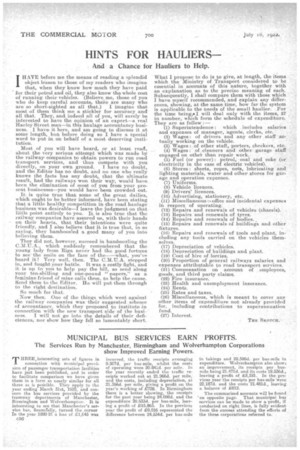HINTS FOR HAULIERS
Page 20

If you've noticed an error in this article please click here to report it so we can fix it.
And a Chance for Hauliers to Help.
IHAVE before me the means of reading a splendid object lesson to those of my readers who imagine that, when they know how much they have paid ' for their petrol and oil, they also know the whole cost of running their vehicles. (Believe me, those of you who do keep careful accounts, there are many who are so short-sighted as all that.) I imagine that most of them think me a stickler for accuracy and all that. They, and, indeed all of you, will surely ioe interested to have the opinion of an expert—a real Harley Street man—in this haulage accountancy business. I have it here, and am going to discuss it at some length, but before doing so I have a special word to put in on behalf of a most deserving institution.
Most of you will have heard, or at least read, about the very serious attempt which was made by the railway, companies to obtain powers to run road transport services, and thus compete with you directly, on your own ground. I have no doubt, and the Editor has no doubt, and no one who really knows the facts has any doubt, that the ultimate result, had the railways won their way, would have_ been the elimination of most of you from your present bosinesses—you would have been crowded out.
It is quite true that some of the great dailies, which ought to be better informed, have been stating that a little healthy competition in The road haulage business was desirable-1 leave the judgment on that• little point entirely to you. It is also true that the railway companies have assured us, with their hands on their hearts, that their intentions were cjuite friendly, and I also believe that it is true that, in so saying, they bamboozled a good many of you into believing them.
They did not, however, succeed in bamboozling the C.M.U.A.. which suddenly remembered that the young lady from Riga never bad the good fortune to see-the smile on the face of the—what, you've heard it'? Very well, then. The C.M.U.A. stepped in, and fought your battle. It was a costly fight, and it is up to you to help pay the bill, so send along your ten-shilling and one-pound "papers," as a feminine friend of mine calls them, to help the cause. Send them to the Editor. Be will put them through to the right destination.
So much for that.
Now then. One of the things which went against the railway companies was their suggested scheme of accountancy, which they proposed to institute in connection -with the new transport side of the buss• ness. I will not go into the details of their deficiences, nor show how they fell so lamentably short.
What I propose to do is to give, at length, the items which the Ministry of Transport considered to be essential in accounts of this nature, together with an explanation as to the precise meaning of each. Subsequently, I shall compare them with those which I have myself recommended, and explain any differences, showing, at the same time, how far the system is applicable to the needs of the small haulier. For the time being,. I will deal only with the items, 27 in number, which form the schedule of expenditure. They are as follow:—
(I) Superintendence : which includes salaries and ex-oenses of manager, agents, clerks, etc.
(2) Wages: of drivers and any other staff actually working on the vehicle. (3) Wages : of other staff,, porters, checkers, etc. (4) Wages : of cleaners and other garage staff engaged on othelthan repair work. (5) Fuel (or power): petrol, coal and coke (or electricity in the case of electric vehicles). (6) Stores : sheets, ropes, nets, lubricating and lighting materials, water and other stores for garage and operation expenses.
(7) Uniforms.
(8) Vehicle licences. (0) Drivers' licences.
(10) Advertising, stationery, etc.
(11) Miscellaneous :.office and incidental expenses in respect of operating.
(12) Repairs and renewals of vehicles (chassis).
(13) Repairs and renewals of tyres.
(14) Repairs and renewals of bodies.. (15) Repairs and renewals of building's and other fixtures.
(l6) Repairs and renewals of tools and plant, including any tools carried on the vehicles themselves.
(17) Depreciation of vehicles. (18) Depreciation of buildings and plant. (101 Cost of hire of lorries.
(20) Proportion of general railways salaries and expenses attributable to road transport services. (21) Compensation on account of employees, goods, and third party claims.
(22) Fire insurance.
(23) Health and unemployment insurance. (24) Rents.
(25) Rates and taxes.
(26) Miscellaneous, which is meant to cover any other items of expenditure not already provided for, including contributions to superannuation fund.
(27) Interest. THE SKOTCH.
































